- Home
- Tracy Chevalier
The Virgin Blue Page 19
The Virgin Blue Read online
Page 19
— Stop it! she shouted, rushing into the outline and kicking at the stones.
The dark months after Christmas were the hardest. It was so cold that they opened the door only once a day, to get wood and hemp. Often the sky was grey, full of snow, and it was almost as dark outside as in the house. Isabelle would look out, hoping to escape for a moment, but found no comfort in the heavy sky, the smooth surface of the snow broken here and there in the distance by the black tops of firs or scabs of rock. When the cold touched her it felt like a metal bar pressed into her skin.
She began to taste metal as well, in the hard rye bread Hannah baked once a week in the communal oven, in the mushy vegetable stew they ate day after day. She had to force herself to eat, try to ignore the taste of blood, hide her gagging. Often she let Marie finish her food for her.
Then her arms and legs began to itch, in the creases on the inside of the elbow and behind the knee. At first she scratched at her skin through the layers of cloth: it was too cold to undress and pick off the lice. But one day she discovered blood seeping through the cloth, pulled up her sleeves and studied the sores: dry, silvery skin flaking away, rough patches of red, no trace of lice. She hid the rusty stains, fearful of what Etienne would accuse her of if he saw the blood.
She lay in bed at night, staring up at the dark and scratching with as little movement as possible so that Etienne would not notice. She listened to his even breathing, fearful of his waking, preferring to stay awake so that she would be ready – she did not know what for, but she waited in the dark for something, scarcely breathing.
She thought she was being careful, but one night he grabbed her hand and discovered the blood. He beat her and afterwards took her violently from behind. It was a relief not to have to look at his face.
One evening Gaspard came to sit at their fire.
— The granite is ordered, he told Etienne, pulling his pipe from his pocket and taking up his flint. The price is agreed and he has the measurements you gave me. He will bring it before Easter. Now, do you want more? For the chimney itself?
Etienne shook his head.
— I cannot pay for it. And anyway, the limestone here will be good enough for the chimney itself. It is the hearth that gets the hottest and needs the hardest stone.
Gaspard chuckled.
— They think you are crazy, down at the inn. Why does he want a chimney? they ask. He lives in a fine house as it is!
There was a silence; Isabelle knew what they were all thinking: they were remembering the Tournier chimney.
Marie hung at Gaspard's elbow, waiting for him to tickle her. He reached out, chucked her under the chin, pulled her ears.
— Eh, you want a chimney, mon petit souris, is that what you want? You don't like this smoke?
— It's Maman who hates it the most, Marie replied, giggling.
— Ah, Isabelle. Gaspard turned to her. You don't look well. Are you eating enough?
Hannah frowned. Etienne spoke for her.
— There is plenty to eat in this house for those who want it, he said gruffly.
— Bien sûr. Gaspard swept his hands in front of him as if smoothing ruffled cloth. You have had a good hemp crop, you have goats, all is well. Except you lack a chimney for Madame. He nodded at Isabelle. And Madame gets what she wants.
Isabelle blinked and peered at him through the smoke. Again there was silence until Gaspard laughed uncertainly.
— I joke! he cried. I'm teasing you, that's all.
After he left Etienne paced around the room, looking at the fire from every angle.
— The hearth will go here, against this wall, he explained to Petit Jean, patting the wall furthest from the door. We can build through the roof there. You see? There will be four pillars here – he pointed – holding up a stone roof that will lead the smoke up and out the hole we cut at the top.
How big will the hearth be, Papa? Petit Jean asked. As big as the one at the old farm?
Etienne glanced around before his eyes rested on Marie.
— Yes, he said, it will be a big hearth. You think so, Marie?
He rarely spoke her name. Isabelle knew he hated it. She had threatened to put a curse on their crops if he didn't let her name the baby Marie. In all the years she had been with the Tourniers it had been the only time she dared use their fear of her. Now that fear was gone; instead there was anger.
Marie frowned at Etienne. When he continued to look at her with his cold wide eyes she burst into tears. Isabelle put her arm round her daughter.
— It's nothing, chérie, don't cry, she whispered, stroking her hair. You'll make it worse. Don't cry.
Over Marie's head she saw Hannah perched in the far corner of the room. For a moment she thought something was wrong with her. Her face looked different, the web of wrinkles more pronounced. Then she realized it was because the old woman was smiling.
Isabelle began to keep Marie close to her, teaching her to spin, having her roll up balls of thread, knitting little dresses for her doll. Isabelle touched her often, gripping her arm, stroking her hair, as if to reassure herself that the girl was still there. She kept Marie's face clean, scrubbing it with a cloth every day so that it shone through the gloom of the smoke.
— I need to be able to see you, ma petite, she explained, though Marie never asked for an explanation.
Isabelle kept Hannah away from the girl as much as she could, placing herself physically between them.
She did not always succeed. One day Marie came to Isabelle with shiny lips.
—Mémé spread pig fat on my bread! she cried.
Isabelle frowned.
— Maybe she will give you some tomorrow, her daughter continued, to fatten you too. You are becoming so thin, Maman. And so tired.
— Why does Mémé want you to be fat?
— Perhaps I'm special.
— No one is special in the eyes of God, Isabelle said sternly.
— But the pig fat was good, Maman. So good that I want more.
One morning she woke up to the sound of water and knew it was finally over.
Etienne opened the door to let in sunlight and a warmth that lifted her body. Everywhere the snow was melting and forming rivulets that ran down to the stream. The children burst outside as if they had been tied up, running and laughing, dragging clods of mud around on their shoes.
Isabelle knelt in the kitchen garden and let the mud soak her knees. She was alone for the first time in months, all of them so busy with spring's arrival that they left her unguarded. She bowed her head and began to pray out loud.
— Holy Mother, I cannot live through another winter here, she murmured. One winter like this is all I can survive. Please, dear Virgin, do not let this happen again. She pressed her arms across her stomach. Keep me and this baby safe. You are the only one who knows.
Isabelle had not been to Moutier since Christmas. All winter Hannah had taken the bread to be baked. When the weather was fair Etienne had taken the children to church, but Isabelle was always left behind with Hannah. When they heard the pedlar's whistle for his spring visit, Isabelle expected to be told she could not go, to be beaten even for asking. She remained in the garden, planting herbs.
Marie came to find her.
— Maman, she said. Are you coming?
— No, ma petite. You see I am busy here.
— But Papa sent me to find you, to say you can come.
— Your father wants me to come to town?
— Yes. Marie lowered her voice. Please come, Maman. Don't say anything. Just come.
Isabelle looked at her face, blue eyes bright and level, blond hair light on top and dark underneath as her father's had once been. The red hairs had begun to appear again, one per day that Hannah herself now pulled out.
— You are too young to be so wise.
Marie twirled round, plucked at the new lavender bush and ran away laughing.
— We are going to town, all of us! she shouted.
Isabelle tried t
o smile when they reached the crowd gathered at the pedlar's cart. She could feel people staring at her. She had no idea what the town thought of her, whether or not Etienne had encouraged or stifled the rumours about her, or if people talked of her at all.
Monsieur Rougemont approached.
— It is a pleasure to see you again, Isabelle, he said stiffly, taking her hand. We will see you on Sunday as well, I hope?
— Yes, she replied. He would not treat a witch like this, she thought uncertainly.
Pascale came up to her, face tight with concern.
— Isabelle, have you been ill?
Isabelle glanced at Hannah, standing next to her, uncomfortable.
— Yes, she said. Ill with the winter. But better now, I think. 194
— Bella! she heard behind her and turned to see the pedlar hanging over her on his cart. He reached over, took her hand and kissed it. Ah, a joy to see you, Madame! A joy. He held on to her hand and, scrambling among his things, led her round the cart, away from Etienne and Hannah and the children, who watched them but did not follow. It was as if the pedlar had placed a spell on them that froze them in place.
He let go of her hand, squatted on the edge of his cart and looked at her closely.
— But you are so sad, Bella, he said softly. What has happened to you? How can you be so sad with such beautiful blue cloth to look at?
Isabelle shook her head, unable to explain. She closed her eyes to hide her tears.
— Listen, Bella, he said, still quietly. Listen. I must ask you something.
She opened her eyes.
— You trust me, yes?
She looked deep into his dark eyes.
— Yes, I trust you, she whispered.
— You must tell me what colour is your hair.
Isabelle's hand moved automatically to her headcloth.
— Why?
— I have a message maybe for you but I know only for sure when you tell me the colour.
Isabelle shook her head slowly.
— The last news you gave me was that my sister-in-law is dead. Why would I want to hear more from you?
The pedlar leaned closer.
— Because you are sad now and this message may make you happy, no more sad. I promise you, Bella. No bad news. Besides – he paused, looking at her face. It has been bad, this winter for you, yes? You hear no worse than what you have lived.
Isabelle looked down at the mud outlining her shoes. She took a deep breath.
— Red, she said. It's red.
He smiled.
— But that is beautiful, no? The colour of the Virgin's hair, may we bless her. Why to be ashamed? And it is the good answer too! Now you can have the message. It is from a shepherd I meet in Alès in the winter. He describes you and asks me to watch for you. He has black hair and a scar on his cheek. You know?
Isabelle froze. Out of the smoke, the exhaustion, the fear clogging her thoughts, came a glimmer.
— Paul, she whispered.
— Si, si, that is his name! He says to tell you – the pedlar closed his eyes and thought – he still looks for you in summer near the source of the Tarn. He looks for you always.
Isabelle began to weep. Luckily it was Marie rather than Etienne or Hannah who came to her side and took her hand.
— What's wrong, Maman? What did that bad man say to you? She scowled at the pedlar.
— He is not a bad man, Isabelle said through her tears. The pedlar laughed and tousled Marie's hair.
— You, bambina, are like a little boat, a gondola. You rock up and down and hold to the water and you are brave but very small.
He continued to run his fingers through her hair until he found a red strand that Hannah had missed.
— You see, he said to Isabelle, not shameful. Is beautiful.
— Tell him I am there always in my mind, Isabelle said.
Marie looked between them.
— Tell who?
— It is nothing, Marie. We were just talking. Thank you, she said to the pedlar.
— Be happy, Bella.
— I will try.
The day before Good Friday the hearth arrived.
Etienne and the boys were ploughing while Isabelle and Hannah cleaned the house, ridding it of the winter smoke and darkness. They scrubbed the floors and walls, scalded the pots, washed the clothes, changed the straw in the bedding, mucked out the barn. They did not whitewash the walls yet. All the houses in the valley whitewashed their rooms once a year in the spring, but the Tourniers were waiting until after the chimney was built.
Isabelle was stirring a vat full of steaming clothes when she saw the cart approaching, the horse straining against the load.
— Marie, go tell Papa the granite has arrived, she said. Marie dropped the stick she had been pushing among the sodden cloth and ran towards the fields.
By the time Etienne and the boys arrived the man was sitting over a bowl of stew at the newly scrubbed table. He ate quickly, mouth close to the bowl. When he finished he raised his head.
— We will need two more men to lift it.
Etienne nodded at Petit Jean.
— Go and find Gaspard, he said.
While they waited Etienne explained how he would build the chimney.
— First I will dig a bed for it to lie in so it will be even with the floor, he said.
Hannah, who had been standing behind Etienne, took the man's bowl and refilled it, then set it in front of him with a bang.
— Why don't you dig it now? he asked. Then we can set the stone right away.
— It would take too long, Etienne replied uneasily. The ground is still frozen, you see. I don't want to make you wait.
The man kicked at the floor.
— It doesn't feel frozen to me.
— It's still very hard. I have been in the fields and not had the time to dig. Besides, I thought you were coming later. After Easter.
That's not true, Isabelle thought, staring hard at Etienne, who kept his eyes on the floor where the man had kicked a small hole with his toe. Gaspard had told them to expect it before Easter. It was rare to hear him lie so blatantly.
The granite man finished the second bowl. — Your women have no problem cooking on this fire here, he said, jerking his head at the flames in the corner. Why change it?
Etienne shrugged.
— We are accustomed to having a chimney.
— But you are in a new country now. With new customs. They should become yours too.
— Some old ways stay with us always, wherever we go, Isabelle said. They are a part of us. Nothing can replace them completely.
They all stared at her, an ugly look crossing Etienne's face.
Why did I speak? she thought. I know keeping silent is the best way. Why did I say such a thing? Now he will beat me, just like during the winter. And he may hurt the baby. She touched her belly.
When the men arrived Etienne became too busy to act on his anger. It took four of them, all strong men, to lift the slab from the cart and stagger inside with it, where they leaned it against the wall just inside the door. Jacob ran his hands up and down it. Marie spread herself against it as if it were a bed.
— It's warm, Maman, she said. Like home.
Easter was a time of redemption, when the hardship of the winter was explained. Isabelle got out their black clothes for the church service and changed with an easiness she thought she had lost.
This is called hope, she thought. This is what I had forgotten.
She had wondered if Etienne would forbid her to go to church for saying what she had to the granite man, but he did not mention it. Her boldness in speaking was balanced by his lie.
She helped Marie into her dress. Her daughter was fidgety, jumping around the room, laughing to herself. When it was time to go she took Isabelle's hand, Jacob the other, and the three walked down the narrow path side by side, following Etienne and Hannah, Petit Jean running ahead.
Isabella dared not think about the Virgin a
t Chalières. It is enough that I go to the first service and see others, that I walk in the sunshine, she thought. I will not expect more.’
At the end of the morning service at Saint Pierre Etienne simply turned toward Gaspard's house without speaking to Isabelle; the rest of the family fell in behind him. Pascale came up and walked beside her, smiling.

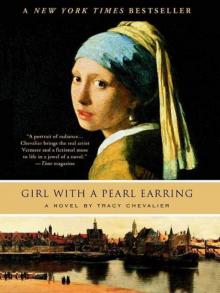 Girl With a Pearl Earring
Girl With a Pearl Earring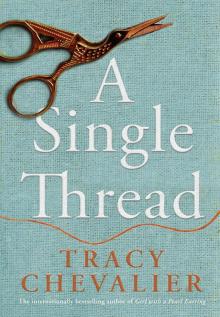 A Single Thread
A Single Thread Reader, I Married Him: Stories Inspired by Jane Eyre
Reader, I Married Him: Stories Inspired by Jane Eyre The Last Runaway
The Last Runaway Burning Bright
Burning Bright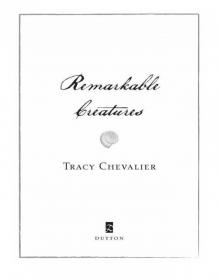 Remarkable Creatures
Remarkable Creatures At the Edge of the Orchard
At the Edge of the Orchard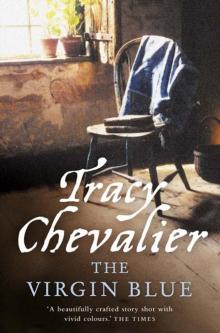 The Virgin Blue
The Virgin Blue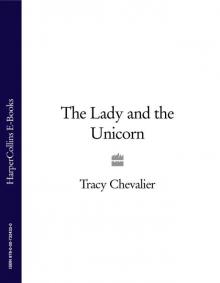 The Lady and the Unicorn
The Lady and the Unicorn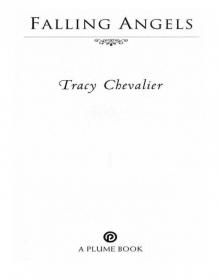 Falling Angels
Falling Angels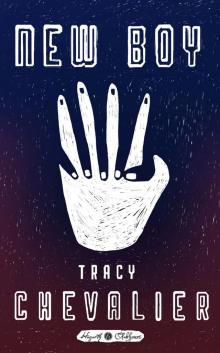 New Boy
New Boy Reader, I Married Him
Reader, I Married Him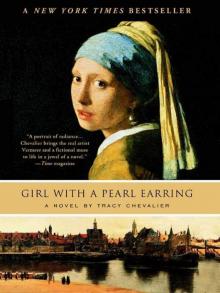 Girl with a Pearl Earring, The
Girl with a Pearl Earring, The